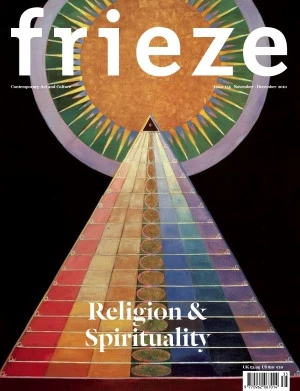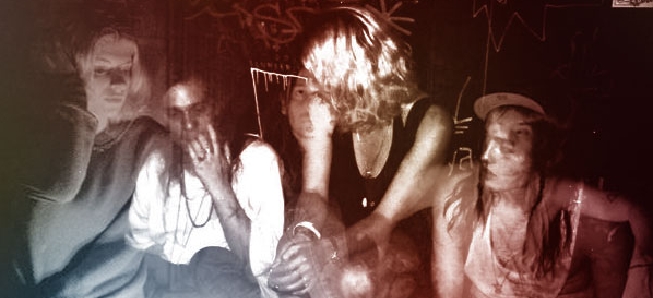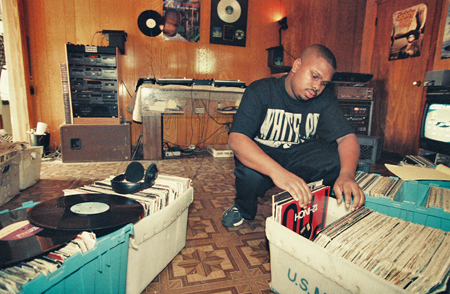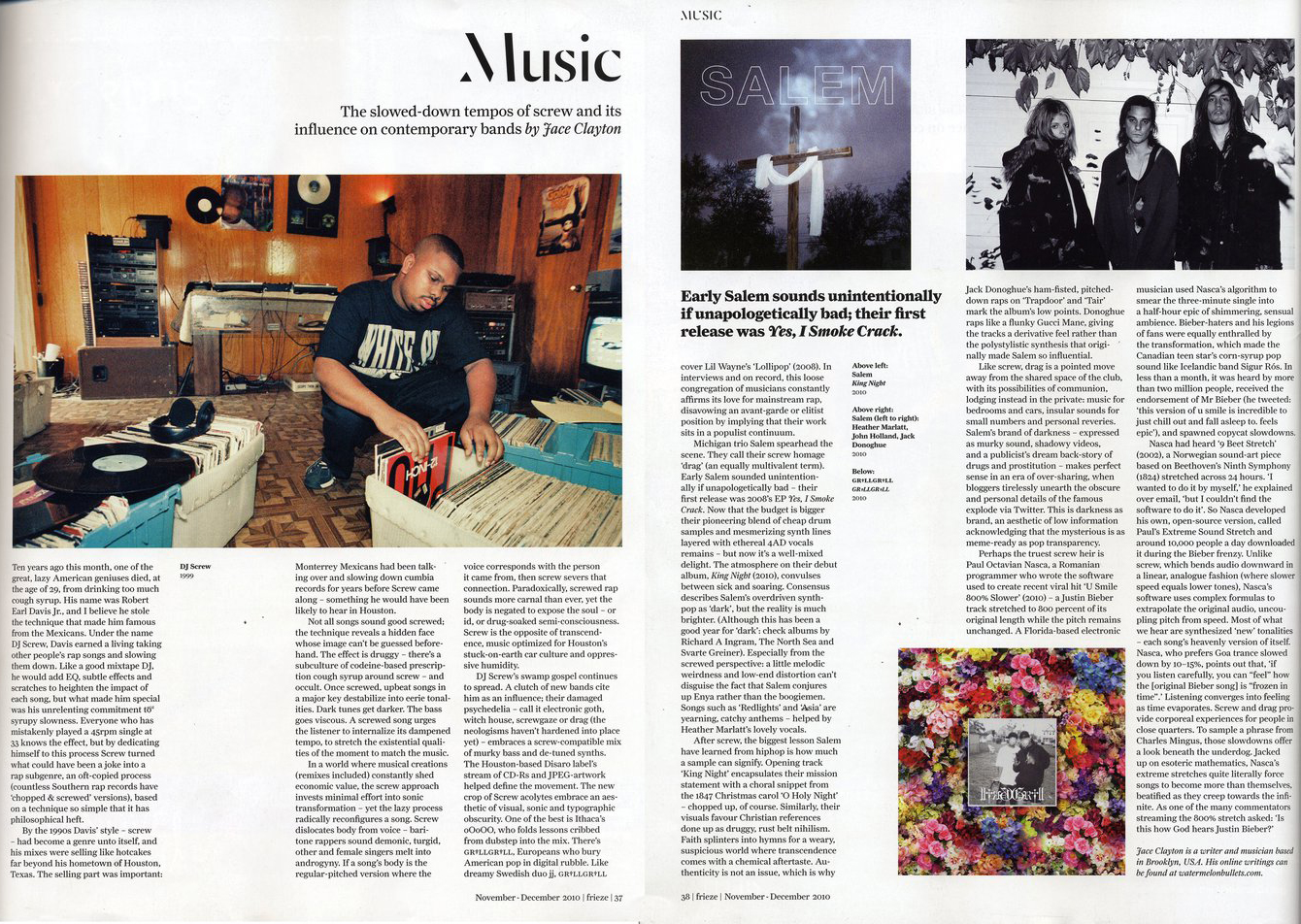https://twitter.com/djrupture/status/1330691425959937
Front cover:

Original link:
https://web.archive.org/web/20101113144 ... le/music2/
Click to read

First published in Frieze Issue 135, November–December 2010
The slowed-down tempos of screw and its influence on contemporary bands

Ten years ago this month, one of the great, lazy American geniuses died, at the age of 29, from drinking too much cough syrup. His name was Robert Earl Davis Jr., and I believe he stole the technique that made him famous from the Mexicans. Under the name DJ Screw, Davis earned a living taking other people’s rap songs and slowing them down. Like a good mixtape DJ, he would add EQ, subtle effects and scratches to heighten the impact of each song, but what made him special was his unrelenting commitment to syrupy slowness. Everyone who has mistakenly played a 45rpm single at 33 knows the effect, but by dedicating himself to this process Screw turned what could have been a joke into a rap subgenre, an oft-copied process (countless Southern rap records have ‘chopped & screwed’ versions), based on a technique so simple that it has philosophical heft.
By the 1990s Davis’ style – screw – had become a genre unto itself, and his mixes were selling like hotcakes far beyond his hometown of Houston, Texas. The selling part was important: Monterrey Mexicans had been talking over and slowing down cumbia records for years before Screw came along – something he would have been likely to hear in Houston.
Not all songs sound good screwed; the technique reveals a hidden face whose image can’t be guessed beforehand. The effect is druggy – there’s a subculture of codeine-based prescription cough syrup around screw – and occult. Once screwed, upbeat songs in a major key destabilize into eerie tonalities. Dark tunes get darker. The bass goes viscous. A screwed song urges the listener to internalize its dampened tempo, to stretch the existential qualities of the moment to match the music.
In a world where musical creations (remixes included) constantly shed economic value, the screw approach invests minimal effort into sonic transformation – yet the lazy process radically reconfigures a song. Screw dislocates body from voice – baritone rappers sound demonic, turgid, other and female singers melt into androgyny. If a song’s body is the regular-pitched version where the voice corresponds with the person it came from, then screw severs that connection. Paradoxically, screwed rap sounds more carnal than ever, yet the body is negated to expose the soul – or id, or drug-soaked semi-consciousness. Screw is the opposite of transcendence, music optimized for Houston’s stuck-on-earth car culture and oppressive humidity.
DJ Screw’s swamp gospel continues to spread. A clutch of new bands cite him as an influence; their damaged psychedelia – call it electronic goth, witch house, screwgaze or drag (the neologisms haven’t hardened into place yet) – embraces a screw-compatible mix of murky bass and de-tuned synths. The Houston-based Disaro label’s stream of CD-Rs and JPEG-artwork helped define the movement. The new crop of Screw acolytes embrace an aesthetic of visual, sonic and typographic obscurity. One of the best is Ithaca’s oOoOO, who folds lessons cribbed from dubstep into the mix. There’s gr†llgr†ll, Europeans who bury American pop in digital rubble. Like dreamy Swedish duo jj, gr†llgr†ll cover Lil Wayne’s ‘Lollipop’ (2008). In interviews and on record, this loose congregation of musicians constantly affirms its love for mainstream rap, disavowing an avant-garde or elitist position by implying that their work sits in a populist continuum.
Michigan trio Salem spearhead the scene. They call their screw homage ‘drag’ (an equally multivalent term). Early Salem sounded unintentionally if unapologetically bad – their first release was 2008’s EP Yes, I Smoke Crack. Now that the budget is bigger their pioneering blend of cheap drum samples and mesmerizing synth lines layered with ethereal 4AD vocals remains – but now it’s a well-mixed delight. The atmosphere on their debut album, King Night (2010), convulses between sick and soaring. Consensus describes Salem’s overdriven synthpop as ‘dark’, but the reality is much brighter. (Although this has been a good year for ‘dark’: check albums by Richard A Ingram, The North Sea and Svarte Greiner). Especially from the screwed perspective: a little melodic weirdness and low-end distortion can’t disguise the fact that Salem conjures up Enya rather than the boogiemen. Songs such as ‘Redlights’ and ‘Asia’ are yearning, catchy anthems – helped by Heather Marlatt’s lovely vocals.
After screw, the biggest lesson Salem have learned from hiphop is how much a sample can signify. Opening track ‘King Night’ encapsulates their mission statement with a choral snippet from the 1847 Christmas carol ‘O Holy Night’ – chopped up, of course. Similarly, their visuals favour Christian references done up as druggy, rust belt nihilism. Faith splinters into hymns for a weary, suspicious world where transcendence comes with a chemical aftertaste. Authenticity is not an issue, which is why Jack Donoghue’s ham-fisted, pitched-down raps on ‘Trapdoor’ and ‘Tair’ mark the album’s low points. Donoghue raps like a flunky Gucci Mane, giving the tracks a derivative feel rather than the polystylistic synthesis that originally made Salem so influential.
Like screw, drag is a pointed move away from the shared space of the club, with its possibilities of communion, lodging instead in the private: music for bedrooms and cars, insular sounds for small numbers and personal reveries. Salem’s brand of darkness – expressed as murky sound, shadowy videos, and a publicist’s dream back-story of drugs and prostitution – makes perfect sense in an era of over-sharing, when bloggers tirelessly unearth the obscure and personal details of the famous explode via Twitter. This is darkness as brand, an aesthetic of low information acknowledging that the mysterious is as meme-ready as pop transparency.
Perhaps the truest screw heir is Paul Octavian Nasca, a Romanian programmer who wrote the software used to create recent viral hit ‘U Smile 800% Slower’ (2010) – a Justin Bieber track stretched to 800 percent of its original length while the pitch remains unchanged. A Florida-based electronic musician used Nasca’s algorithm to smear the three-minute single into a half-hour epic of shimmering, sensual ambience. Bieber-haters and his legions of fans were equally enthralled by the transformation, which made the Canadian teen star’s corn-syrup pop sound like Icelandic band Sigur Rós. In less than a month, it was heard by more than two million people, received the endorsement of Mr Bieber (he tweeted: ‘this version of u smile is incredible to just chill out and fall asleep to. feels epic’), and spawned copycat slowdowns.
Nasca had heard ‘9 Beet Stretch’ (2002), a Norwegian sound-art piece based on Beethoven’s Ninth Symphony (1824) stretched across 24 hours. ‘I wanted to do it by myself,’ he explained over email, ‘but I couldn’t find the software to do it’. So Nasca developed his own, open-source version, called Paul’s Extreme Sound Stretch and around 10,000 people a day downloaded it during the Bieber frenzy. Unlike screw, which bends audio downward in a linear, analogue fashion (where slower speed equals lower tones), Nasca’s software uses complex formulas to extrapolate the original audio, uncoupling pitch from speed. Most of what we hear are synthesized ‘new’ tonalities – each song’s heavenly version of itself. Nasca, who prefers Goa trance slowed down by 10–15%, points out that, ‘if you listen carefully, you can “feel” how the [original Bieber song] is “frozen in time”.’ Listening converges into feeling as time evaporates. Screw and drag provide corporeal experiences for people in close quarters. To sample a phrase from Charles Mingus, those slowdowns offer a look beneath the underdog. Jacked up on esoteric mathematics, Nasca’s extreme stretches quite literally force songs to become more than themselves, beatified as they creep towards the infinite. As one of the many commentators streaming the 800% stretch asked: ‘Is this how God hears Justin Bieber?’
Jace Clayton
Click to view

